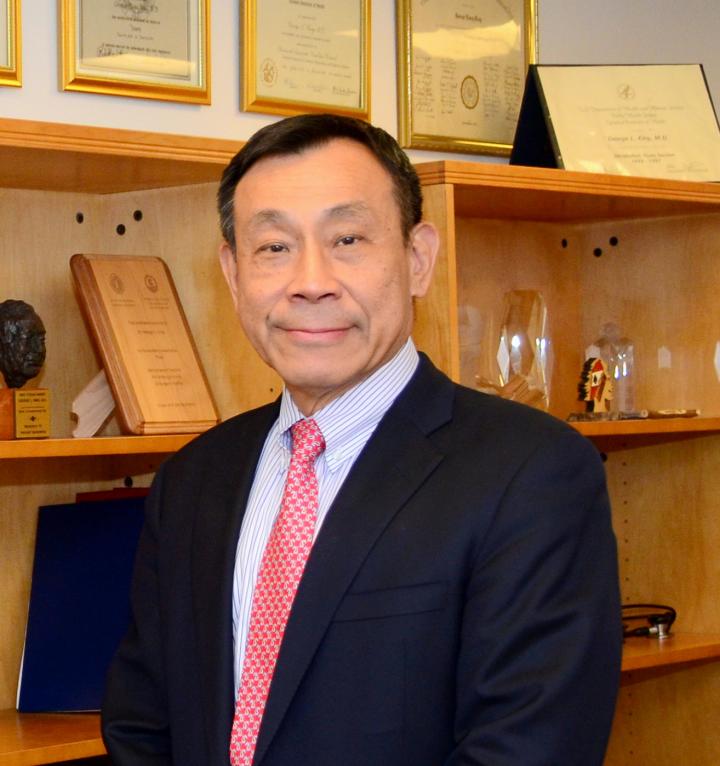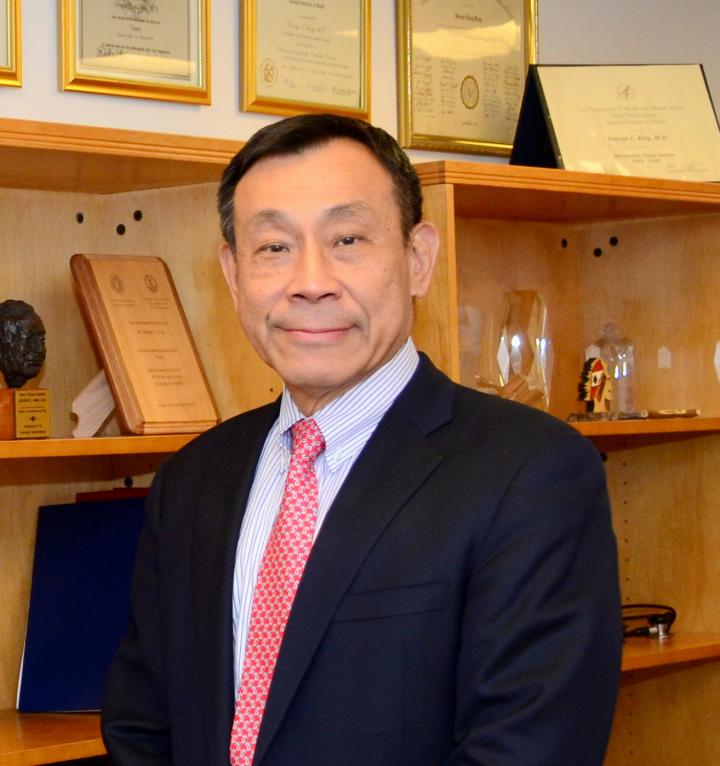
Credit: John Soares/Joslin Diabetes Center
BOSTON – (April 24, 2017) – More than 660,000 people in the United States suffer from end-stage kidney disease, which can only be treated by dialysis or kidney transplantation. Almost half of these patients develop the condition as a complication of diabetes. Scientists at Joslin Diabetes Center now have revealed an unexpected route to slow the progression of diabetic kidney disease, targeting a biological pathway that is the main channel for the metabolism of glucose in the cell.
The finding builds on an earlier surprise from the Joslin Medalist Study program, which looks for clues on how some people live with type 1 diabetes for more than 50 years with unusually low levels of complications, says George King, M.D., Joslin's Chief Scientific Officer and Professor of Medicine at Harvard Medical School. That previous work documented that among Medalists with similar control of their blood glucose levels, some people developed kidney disease and others did not.
Described in a paper in Nature Medicine, the current study set out to find what biological mechanisms might protect the kidneys of healthy Medalists against damage from high blood glucose levels.
Using postmortem kidneys donated from generous Medalists, the Joslin team looked at the levels of thousands of proteins expressed in kidney cells that help to filter blood, and compared the results for Medalists with and without kidney disease.
The investigators expected to observe that the unhealthy kidneys demonstrate high levels of a host of enzymes that process blood glucose, says King, who is corresponding author on the paper. Increased glucose processing has long been thought to inflict damage on the mitochondria (the cell's power generators), which then produce large amounts of reactive oxygen molecules, which in turn leads to kidney disease.
But the Joslin team found just the opposite–much higher levels of these enzymes were detected instead in the protected kidneys.
The scientists got another surprise when they followed up on this finding with mouse experiments that exposed specialized kidney cells called "podocytes", a key component of the blood filtering, to high levels of glucose. "Rather than having damaged mitochondria, somehow these cells, when their glucose metabolism is activated, stimulate themselves to make new mitochondria, so the mitochondria actually work better," King says.
Next, the research team decided to test potential protective treatments by activating a key enzyme in glucose-processing pathways. They picked an enzyme known as PKM2, whose levels almost tripled in healthy Medalists' kidneys compared to diseased kidneys in the study, and which helps the cell take the final step in supplying fuel by the mitochondria. Another reason to pick PKM2 was that cancer researchers have studied the enzyme intensively (because low activity of PKM2 can boost tumor growth) and created many research tools and drug compounds to probe its actions, King says.
After colleagues at Sanofi provided an investigational compound that activates PKM2, the team showed that this compound could stop abnormalities in mouse podocytes both in cell culture and in two mouse models of diabetes.
The experimenters successfully tested the compound in the two mouse models "either treating right at the beginning of diabetes, or for reversal of toxic effects after three or four months of diabetes, which is even more difficult," King says.
Analysis of a small number of kidneys from non-Medalists suggests that similar glucose-processing protective mechanisms may be found in some people with type 2 diabetes as well as type 1 diabetes. Joslin scientists plan to explore kidney disease across a much broader sample of people with diabetes to see if the mechanisms do indeed work across this spectrum, King says.
"Anything we could do to delay the progression of diabetic kidney disease would be very helpful, because the need is great and there hasn't been a new drug in decades," he adds. "This approach also may prove help defend against eye, nerve or other complications of diabetes."
###
Joslin's Weier Qi was lead author on the Nature Medicine paper. Other Joslin co-authors included Hillary Keenan, Qian Li, Atsushi Ishikado, I-Hsien Wu, Alison Burkart, Stephanie Hastings, David Pober, Christopher Cahill, Monika Niewczas, Liane Tinsley, Peter Amenta, Edward Feener and Robert Stanton. Other contributors included Aimo Kannt, Thorsten Sadowski and Anja Pfenninger of Sanofi in Frankfurt, Germany; Mark Yorek and Lawrence Coppey of the Veterans Affairs Medical Center in Iowa City, Iowa; Samuel Lockhart of Queen's University Belfast in Belfast, UK; Chong Wee Liew and Guifen Qiang of the University of Illinois at Chicago in Chicago, Illinois; William Israelsen of the University of Texas Southwestern Medical Center in Dallas, Texas; Isaac Stillman of Beth Israel Deaconess Medical Center in Boston; and Matthew Vander Heiden of Massachusetts Institute of Technology in Cambridge, MA.
Lead funding for the work came from the National Institute of Diabetes and Digestive and Kidney Diseases/National Institutes of Health (grants 1DP3DK112192-01, DK094333-01 and 1R24DK090961-010); the JDRF; and the Mary Iacocca Research Foundation. Additional research support was provided by Sanofi; the Thomas Beatson, Jr. Foundation; and the Brehm Foundation.
Sanjoy Dutta, JDRF Assistant Vice President, Translational Development & International Partnerships, commented, "JDRF is proud to have supported this research that will ultimately improve the lives of people with type 1 diabetes (T1D) by preventing or delaying progression of kidney disease – one of the highest causes of morbidity and mortality globally. Realizing the importance of taking lessons from human biology, JDRF supported the Joslin Medalist Program that studies individuals with long standing T1D to better understand the progression of diabetes and accelerate development of innovative therapies to thwart the complications associated with diabetes, without the necessity of extreme measures like dialysis or a kidney transplant. We're thankful to the research team for helping to advance JDRF's mission to cure, prevent and treat T1D and its complications."
About Joslin Diabetes Center
Joslin Diabetes Center is world-renowned for its deep expertise in diabetes treatment and research. Joslin is dedicated to finding a cure for diabetes and ensuring that people with diabetes live long, healthy lives. We develop and disseminate innovative patient therapies and scientific discoveries throughout the world. Joslin is an independent, non-profit institution affiliated with Harvard Medical School, and one of only 11 NIH-designated Diabetes Research Centers in the U.S.
For more information, visit http://www.joslin.org or follow @joslindiabetes
Media Contact
Jeffrey Bright
[email protected]
@joslindiabetes
http://www.joslin.org
Original Source
http://www.joslin.org/news/forging-new-defenses-against-diabetic-kidney-disease.html





